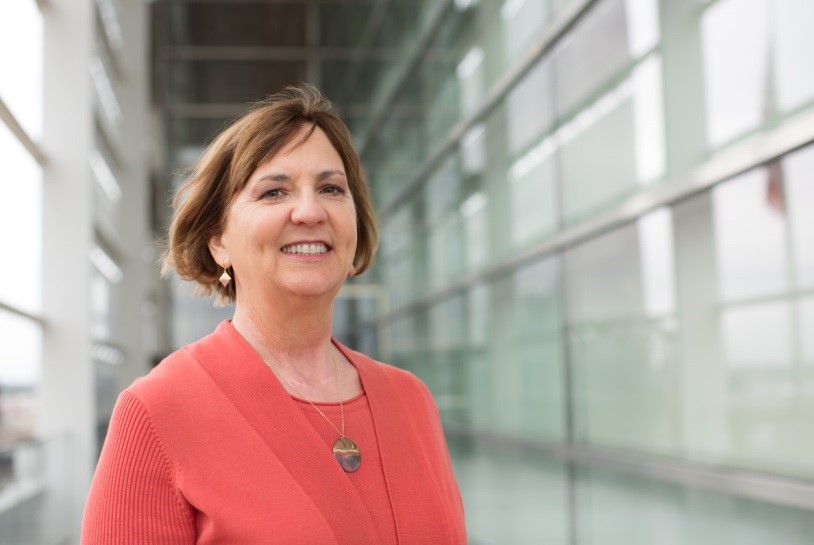For more than 40 years, Beth Barry has played a role in the shaping of South Carolina school districts’ health and wellness initiatives, as well as in the growth of Wholespire, formerly Eat Smart Move More South Carolina, and many other state and community coalitions. Barry recently retired from the Alliance for a Healthier Generation.
As she laughs, Barry says, “My children say they’ll believe it when they see it!” That’s because this retirement marks her second in her long career, and they probably know just how passionate she is about healthy students, health schools, and healthy families.
A native of Columbia, Barry received her bachelor’s degree in health promotion, education, and behavior and her master’s in public health from the University of South Carolina. In fact, she obtained her master’s plus 30, meaning she was eligible for a South Carolina teaching certificate. That’s pretty impressive considering Barry was never really interested in teaching.
In between degrees, she spent eight years at the South Carolina Department of Health and Environmental Control before moving on to Richland School District One for the next 20 years coordinating the South Carolina Department of Education’s first Healthy Schools Grant from the CDC. She retired from Richland One and landed at the Alliance for a Healthier Generation.
That’s where many of us know Barry. Her work took her to school districts across the state as she provided onsite support and training to districts participating in the Alliance’s Healthy Schools and Communities Program. She also helped schools understand and implement evidence-based practices that support healthy eating and active living.
“I realized early on in my career that working in schools is similar to that famous bank robber who replied to a reporter’s inquiry as to why he robbed banks by saying ‘because that’s where the money is’,” says Barry. “Schools are where the young people are. So if we’re focused on prevention, I realized that’s where we needed to be.”
Barry went on to explain that school health initiatives have the potential to impact the most people because they are often one of the largest employers, especially in rural South Carolina. The idea is that when students and staff are exposed to healthy opportunities and choices, then those healthy behaviors at school can impact their families’ health and wellness.
“If we can also impact staff wellness, and perhaps indirectly the wellbeing of the staff’s family, then a focus on wellness in our school communities can really have a significant, positive effect on population health,” explains Barry, “as well as helping schools increase attendance and reach other goals.”
Many public health professionals have had the honor of working with Barry in some capacity, whether it be through Wholespire, state coalitions, grant initiatives, or other collaborative work.
“I met Beth in 2013, soon after starting my position as the School Wellness Consultant at DHEC. She immediately became my mentor starting with road trips to school meetings across the state,” says Erica Ayers. “Beth taught me everything I know about school health, helping me grow from a young novice to the established professional I am today. In return, I taught her how to use the GPS in her phone instead of printed MapQuest directions. Although Beth has retired, her passion lives on in everyone she has worked with over the years.”
She served several years as Wholespire’s second chairman of the Board of Directors. Her role was pivotal as she led staff during a transition between executive directors.
“I have been so impressed with Wholespire over the years. I think the whole evolution that was in health promotion and other aspects of public health, which Wholespire embraced, was to focus on policy, systems, and environmental change,” says Barry. “When I first started my career, the focus was very much on individual behavior change, and there wasn’t much consideration of whether or not individuals had any much less easy access to healthy choices. I think that focus has been transformative and made us so much better in public health and school health. There’s still a lot to be done, but it’s like everything just fell in place. We started looking at things more holistically.”
Over the years, Barry has collaborated with many people on the public health and school health scene. For coalitions that want to work with schools, she says to start with the school district wellness coordinator. Show them you’re there to help and not to hinder their progress. Nurture the relationship and then reveal what you need from them. She advises using this approach because schools are overwhelmed with work and they often get bad press, which makes administrators hesitant to work with outsiders.
Asked how she plans to spend her retirement, her first response was keeping her grandchildren and spending more time with her children. Her second response: “I have signed on with a very, very part-time position with a non-profit.” Barry continues to practice yoga, participate in fitness classes at Drew Wellness Center, and volunteer at her church.
“My career in public and school health has provided a wonderful opportunity that I so appreciate to meet and work with talented, committed partners throughout the state,” says Barry. “I was very fortunate to work statewide for so many years and develop life-long friendships that I appreciate so much. And I’m thrilled that we have such talented, passionate, young professionals in health promotion, public health, and school health who are committed to this work.”


